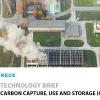Sustainable Energy Press Releases
Displaying Results 51 - 75 of 138
Human-caused methane emissions are rising, and must be reduced by 40 to 45 per cent by 2030 to limit global temperature rise to 1.5° C, warned the Global Methane Assessment released last month by the Climate and Clean Air Coalition (CCAC) and the United Nations Environment Programme (UNEP).
A UNECE-led partnership will improve energy efficiency of the global building supply chain and its products to deliver high performance buildings in seven UNECE member States: Armenia, Georgia, Kyrgyzstan, Republic of Moldova, Tajikistan, Ukraine, and Uzbekistan.
The launch of the
More robust monitoring and measuring systems are required to meet the Sustainable Development Goals (SDGs), according to a UNECE report on Measuring and Monitoring progress towards SDGs that uses a “nexus” approach to chart a course for more “joined up” activities.
High-quality statistics
Recognizing the vital importance of mobility and connectivity for sustainable economic development and taking stock of key challenges, UNECE has consolidated its work in this cross-cutting area to help countries leverage its tools to steer recovery efforts towards the Sustainable Development Goals
Localizing the Sustainable Development Goals at the urban level is crucial to deliver on the 2030 Agenda, stresses UNECE in a new report that advocates for a “cities-based” and “people-smart” approach to sustainable development.
With cities today as the driving force in economic,
UNECE calls for integrated and sustainable natural resource use through a "nexus" approach
The use of material resources, fuelled by economic and population growth, urbanisation and societal changes, has increased more than ten times since 1900 and is set to double again by 2030. The annual global extraction of materials has increased from 27 to 92 billion tonnes since 1970, while the
Los países de Europa del Este, el Cáucaso y Asia Central albergan un importante potencial de almacenamiento de CO2. Utilizando datos disponibles públicamente, el análisis realizado por expertos en geología identificó por primera vez un potencial de almacenamiento en yacimientos
A new report from the United Nations warns that time is running out to deliver on the Paris Agreement and the 2030 Agenda for Sustainable Development and calls for rapid deployment of carbon capture use and storage (CCUS) to meet carbon neutrality targets.
Micro-, small-, and medium-sized enterprises (MSMEs), and women-led MSMEs in particular, have been especially vulnerable to the impacts of the COVID-19 crisis. However, the crisis has also caused a dramatic shift in the business-as-usual approach and paved the way for innovations, green growth, and
The availability of natural resources is at the core of attaining the Sustainable Development Goals (SDGs). The United Nations Framework Classification for Resources (UNFC) is a global standard for the sustainable management of all energy and mineral resources in alignment with the objectives of
Micro-, small and medium enterprises (MSMEs) are the backbone of the economy in the UNECE region and have been hard hit by the COVID-19 economic crisis. This stress in turn impacted the supply chains of many industries, especially those involved in supporting essential services required for the
Micro-, small and medium enterprises (MSMEs) are among the worst hit financially by the COVID-19 pandemic. They represent over 90 percent of all companies in most countries in the UNECE region and are responsible for over half of GDP. Therefore, the economic recovery depends to a large extent on
With almost half of the world under lockdown, the continued supply of certain critical raw materials needed for an effective response to the COVID-19 pandemic has become a concern.
The Active Pharmaceutical Ingredients (APIs) and excipients of several drugs, including antibiotics such
Improving energy efficiency is one of the most cost-effective options for meeting growing energy demand, ensuring more rational use of energy, contributing to a better environment and to energy security in most countries, and securing economic well-being and improved quality of life.Today,
Renewable energy now accounts for around one third of global power generation capacity, with increases being led by investments in solar photovoltaics (PV) and wind energy. More than 180 GW of renewable energy were installed in 2018, of which 100 GW were solar PV. As the costs of renewables
Methane is a powerful short-lived climate pollutant. It is also the main precursor of tropospheric ozone (O3). Over a 20-year period, methane’s effect on global warming is 84 times greater than carbon dioxide. Fossil fuel production, including coal mining, accounts for 29% of human-made methane
The global climate emergency cannot be addressed without the rapid transformation of the energy system. Accelerating the shift to renewable energy sources and dramatically improving energy efficiency will play a crucial role. On the day of the UN Climate Action Summit 2019, UNECE has
UNECE and Pittsburgh’s Green Building Alliance (GBA) signed an agreement launching Pittsburgh’s International Centre of Excellence on High Performance Buildings. Pittsburgh joins New York City’s Building Energy Exchange as the 2nd Centre of Excellence in a global network of sustainability
Renewable energy-based electric generating capacity is rapidly growing and is expected to deliver up to 30 per cent of the world’s power demand by 2023. Solar energy will significantly contribute to this growth and play a major role in the energy mix of the future. To help accelerate this
The renewable energy industry has grown significantly in the last few decades, and today, supplies almost a fifth of total primary energy demand. The contribution of renewables at large, especially wind energy, will continue to rise over the coming years. In 2018, 171 gigawatts (GW) of renewable
Country after country in Europe is racing to put more and more electric cars on the road as Europe strives to position itself as a world leader in electric vehicle innovation, digitization and decarbonization. If electric vehicles are going to feature so prominently in a connected and automated
Sustainable development must be underpinned by sustainable energy systems. Bosnia and Herzegovina is a country that is still heavily dependent on coal and large hydropower at 67% and 31% of total electricity production, respectively. Significant initiatives are emerging to use the country’s vast
Energy efficiency remains a challenge for countries in the UNECE region. Existing technologies can reduce energy consumption by 30 to 50 percent in buildings without significantly increasing investment costs. Moreover, improving the energy performance of a residential building goes hand-in-hand
The United Nations Framework Classification for Resources (UNFC) is a universally acceptable and internationally applicable scheme for the sustainable management of all energy and mineral resources. It can harmonise data from different classification and reporting standards and also make a
UNECE and the European Commission jointly hosted two sessions looking at the policy and investment options and challenges for scaling up deployment in Renewable energy and Energy efficiency and at the same time for durably addressing energy poverty and improving quality of life during the 9th







